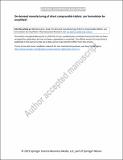On-Demand Manufacturing of Direct Compressible Tablets: Can Formulation Be Simplified?
Author(s)
Azad, Mohammad A; Osorio, Juan G; Wang, Allison; Klee, David M; Eccles, Mary E; Grela, Erin; Sloan, Rebecca; Hammersmith, Gregory; Rapp, Kersten; Brancazio, David; Myerson, Allan S; ... Show more Show less
Download11095_2019_2716_ReferencePDF.pdf (1.668Mb)
Publisher Policy
Publisher Policy
Article is made available in accordance with the publisher's policy and may be subject to US copyright law. Please refer to the publisher's site for terms of use.
Terms of use
Metadata
Show full item recordAbstract
Abstract
Purpose
Oral direct compressible tablets are the most frequently used drug products. Manufacturing of tablets requires design and development of formulations, which need a number of excipients. The choice of excipients depends on the concentration, manufacturability, stability, and bioavailability of the active pharmaceutical ingredients (APIs). At MIT, we developed a miniature platform for on-demand manufacturing of direct compressible tablets. This study investigated how formulations could be simplified to use a small number of excipients for a number of different API’s in which long term stability is not required.
Method
Direct compressible tablets of five pharmaceutical drugs, Diazepam, Diphenhydramine HCl, Doxycycline Monohydrate, Ibuprofen, and Ciprofloxacin HCl, with different drug loadings, were made using direct compression in an automated small scale system.. The critical quality attributes (CQA) of the tablets were assessed for the quality standards set by the United States Pharmacopeia (USP).
Results
This miniature system can manufacture tablets - on-demand from crystalline API using the minimum number of excipients required for drug product performance. All drug tablets met USP quality standards after manufacturing and after 2 weeks of accelerated stability test, except for slightly lower drug release for Ibuprofen.
Conclusions
On-demand tablets manufacturing where there is no need for long term stability using a flexible, miniature, automated (integrated) system will simplify pharmaceutical formulation design compared to traditional formulations. This advancement will offer substantial economic benefits by decreasing product time-to-market and enhancing quality.
Date issued
2019-10-24Department
Massachusetts Institute of Technology. Department of Chemical EngineeringPublisher
Springer US
Citation
Pharmaceutical Research. 2019 Oct 24;36(12):167
Version: Author's final manuscript